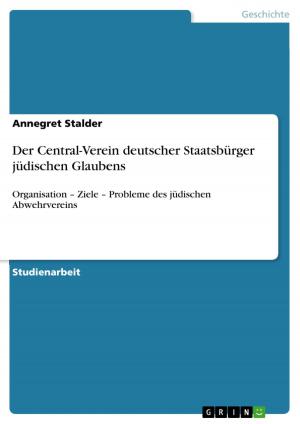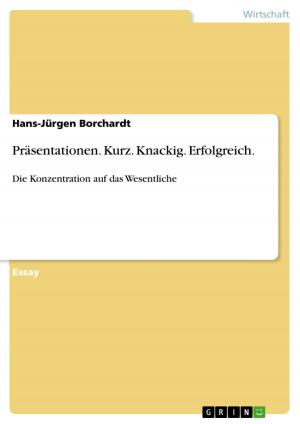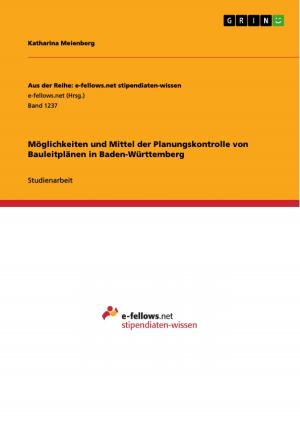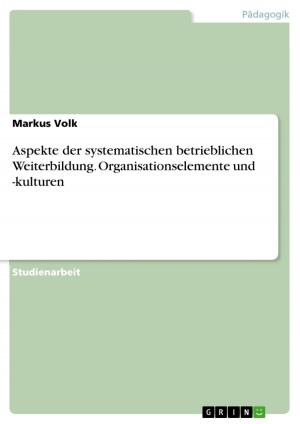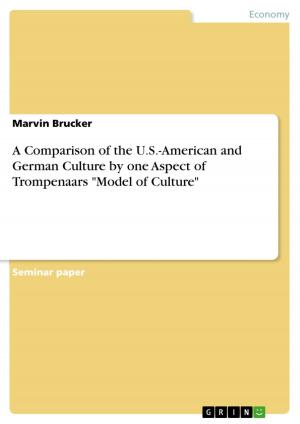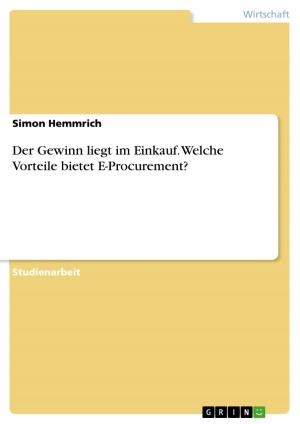Microfinance as a driving force for socio-economic development in emerging economies. Measuring its effectiveness in North India
Nonfiction, Social & Cultural Studies, Political Science, Politics, Economic Policy| Author: | Kumar Deepam | ISBN: | 9783668091153 |
| Publisher: | GRIN Verlag | Publication: | November 20, 2015 |
| Imprint: | GRIN Verlag | Language: | English |
| Author: | Kumar Deepam |
| ISBN: | 9783668091153 |
| Publisher: | GRIN Verlag |
| Publication: | November 20, 2015 |
| Imprint: | GRIN Verlag |
| Language: | English |
Master's Thesis from the year 2015 in the subject Business economics - Economic Policy, grade: A2, University of Limerick (Kemmy Business School), course: MSc in Financial Services, language: English, abstract: This thesis examines the effectiveness of microfinance in the socio-economic development with the major focus on poverty reduction and gender equality (in the sense of women empowerment) in Northern part of India. The purpose of this research is to measure the effectiveness of microfinance in the sense of socio-economic development in the Northern part of India. The aim has been accomplished by using the methods of statistical analysis and through the examination of primary and secondary data. The methods of data analysis that were employed in the research incorporated chi-square tests, independent sample t-tests and binary logistic regressions. The data has been analysed based on the survey of 100 respondents, who were below nationally defined poverty line in Lucknow (Major metropolitan city of North India) and areas nearby. The survey data was divided into two parts i.e. 60% of the respondents were the non-microfinance respondents and remaining 40% were the microfinance recipients. Recommendations regarding the research have been based on the findings from the analysis. Findings of the study have shown that young entrepreneurs who are below poverty line are more likely to apply for the micro loan. This has been explained by the binary logistic regression analysis of the whole sample. Further, the findings show that microfinance has very low outreach in North India. This has been explained by the data from the MIX market, level of awareness of microfinance among the non-microfinance respondents and the case study of Nat Purva Village near Lucknow. Furthermore, the results disclosed that microfinance recipients face difficulty while applying to micro loan due to which they also face difficulty in paying the loan amount with interest back. This has been explained by the chi-square test and binary logistic regression analysis of the responses from the microfinance recipients. However, overall impact of microfinance on both poverty reduction and gender equality is turned out to be positive. This has been explained by MFI's major focus on women entrepreneurs, changes in social and economic conditions of the recipients after taking the micro loan, expenditure of the recipients on education of children, recipient's recommendations regarding micro loan and the ability of recipients to apply for the micro loan again.
Kumar Deepam was born in Lucknow, India, in 1990. He received the B-Tech degree in Information Technology from the Uttar Pradesh Technical University, India, in 2012, and the MSc degree in Financial Services from University of Limerick, Ireland, in 2015. Following his primary degree of engineering in IT, in 2012, he joined HCL Technologies Ltd., India as a Graduate Engineer Trainee, and in 2014 he got promoted to Senior Analyst on the multinational client project Novartis Pharmaceuticals. He always thrive to pursue finance on account of being influence from a merchandise family while growing up but due to his interest in technology, he was not able to make it in its undergraduate. Then he left his job and travel all the way from India to Ireland to make it in its postgraduate. He displayed strong leadership qualities while serving as an orientation guide in University of Limerick's Orientation week and first Seven weeks program. He has recently completed his masters in financial services along with the Bloomberg trading floor certifications.
Master's Thesis from the year 2015 in the subject Business economics - Economic Policy, grade: A2, University of Limerick (Kemmy Business School), course: MSc in Financial Services, language: English, abstract: This thesis examines the effectiveness of microfinance in the socio-economic development with the major focus on poverty reduction and gender equality (in the sense of women empowerment) in Northern part of India. The purpose of this research is to measure the effectiveness of microfinance in the sense of socio-economic development in the Northern part of India. The aim has been accomplished by using the methods of statistical analysis and through the examination of primary and secondary data. The methods of data analysis that were employed in the research incorporated chi-square tests, independent sample t-tests and binary logistic regressions. The data has been analysed based on the survey of 100 respondents, who were below nationally defined poverty line in Lucknow (Major metropolitan city of North India) and areas nearby. The survey data was divided into two parts i.e. 60% of the respondents were the non-microfinance respondents and remaining 40% were the microfinance recipients. Recommendations regarding the research have been based on the findings from the analysis. Findings of the study have shown that young entrepreneurs who are below poverty line are more likely to apply for the micro loan. This has been explained by the binary logistic regression analysis of the whole sample. Further, the findings show that microfinance has very low outreach in North India. This has been explained by the data from the MIX market, level of awareness of microfinance among the non-microfinance respondents and the case study of Nat Purva Village near Lucknow. Furthermore, the results disclosed that microfinance recipients face difficulty while applying to micro loan due to which they also face difficulty in paying the loan amount with interest back. This has been explained by the chi-square test and binary logistic regression analysis of the responses from the microfinance recipients. However, overall impact of microfinance on both poverty reduction and gender equality is turned out to be positive. This has been explained by MFI's major focus on women entrepreneurs, changes in social and economic conditions of the recipients after taking the micro loan, expenditure of the recipients on education of children, recipient's recommendations regarding micro loan and the ability of recipients to apply for the micro loan again.
Kumar Deepam was born in Lucknow, India, in 1990. He received the B-Tech degree in Information Technology from the Uttar Pradesh Technical University, India, in 2012, and the MSc degree in Financial Services from University of Limerick, Ireland, in 2015. Following his primary degree of engineering in IT, in 2012, he joined HCL Technologies Ltd., India as a Graduate Engineer Trainee, and in 2014 he got promoted to Senior Analyst on the multinational client project Novartis Pharmaceuticals. He always thrive to pursue finance on account of being influence from a merchandise family while growing up but due to his interest in technology, he was not able to make it in its undergraduate. Then he left his job and travel all the way from India to Ireland to make it in its postgraduate. He displayed strong leadership qualities while serving as an orientation guide in University of Limerick's Orientation week and first Seven weeks program. He has recently completed his masters in financial services along with the Bloomberg trading floor certifications.



